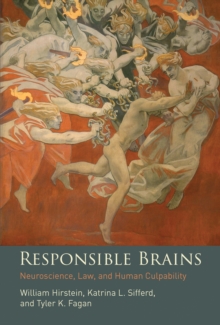Description
| Product ID: | 9780262038782 |
| Product Form: | Hardback |
| Country of Manufacture: | GB |
| Series: | Responsible Brains |
| Title: | Responsible Brains |
| Subtitle: | Neuroscience, Law, and Human Culpability |
| Authors: | Author: Katrina L. Sifferd, William Hirstein, Tyler K. Fagan |
| Page Count: | 296 |
| Subjects: | Physiological and neuro-psychology, biopsychology, Physiological & neuro-psychology, biopsychology, Cognition and cognitive psychology, Methods, theory and philosophy of law, Criminal law: procedure and offences, Cognition & cognitive psychology, Jurisprudence & philosophy of law, Criminal law & procedure |
| Description: | Select Guide Rating An examination of the relationship between the brain and culpability that offers a comprehensive neuroscientific theory of human responsibility. When we praise, blame, punish, or reward people for their actions, we are holding them responsible for what they have done. Common sense tells us that what makes human beings responsible has to do with their minds and, in particular, the relationship between their minds and their actions. Yet the empirical connection is not necessarily obvious. The “guilty mind” is a core concept of criminal law, but if a defendant on trial for murder were found to have serious brain damage, which brain parts or processes would have to be damaged for him to be considered not responsible, or less responsible, for the crime? What mental illnesses would justify legal pleas of insanity? In Responsible Brains, philosophers William Hirstein, Katrina Sifferd, and Tyler Fagan examine recent developments in neuroscience that point to neural mechanisms of responsibility. Drawing on this research, they argue that evidence from neuroscience and cognitive science can illuminate and inform the nature of responsibility and agency. They go on to offer a novel and comprehensive neuroscientific theory of human responsibility. The authors'' core hypothesis is that responsibility is grounded in the brain''s prefrontal executive processes, which enable us to make plans, shift attention, inhibit actions, and more. The authors develop the executive theory of responsibility and discuss its implications for criminal law. Their theory neatly bridges the folk-psychological concepts of the law and neuroscientific findings. |
| Imprint Name: | MIT Press |
| Publisher Name: | MIT Press Ltd |
| Country of Publication: | GB |
| Publishing Date: | 2018-12-04 |


